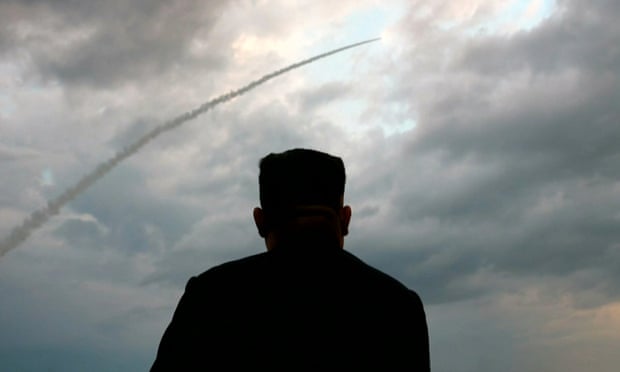North Korea has fired ballistic missile into sea, says South
Launch, possibly from a submarine, comes as US, South Korean and Japanese spy chiefs meet for talks in Seoul
North Korea launched a ballistic missile – possibly from a submarine – into the Sea of Japan, South Korea’s military has said, in the latest in a series of tests by Pyongyang over recent weeks.
One ballistic missile was launched about 10:17am local time from the vicinity of Sinpo, South Korea’s joint chiefs of staff said, where North Korea keeps submarines as well as equipment for test firing submarine-launched ballistic missiles (SLBMs).
“Our military is closely monitoring the situation and maintaining readiness posture in close cooperation with the United States, to prepare for possible additional launches,” the joint chiefs of staff said in a statement.
A South Korean newspaper, Joongang Ilbo, cited an unnamed military source as saying the government was “assuming that it was an SLBM test”.
The North is known to be developing a submarine-launched ballistic missile (SLBM) and previously carried out an underwater launch, although analysts said that one was likely to have been from a submerged platform rather than a submarine.
“There is a high possibility the North launched an SLBM,” said Shin Beom-chul, a researcher at the Korea Research Institute for National Strategy.
Japan’s prime minister, Fumio Kishida, said that two ballistic missiles had been detected, and that it was “regrettable” that North Korea had conducted a string of missile tests in recent weeks. There was no immediate explanation from South Korea’s JCS for the conflicting number of missiles detected.
Kishida cancelled scheduled campaign appearances in northern Japan, and the deputy chief cabinet secretary told reporters that he was planning to return to Tokyo to deal with the missile situation.
South Korea’s unification ministry, which handles inter-Korean relations, said daily routine liaison calls with the North were conducted normally on Tuesday.
Nuclear-armed North Korea has in recent weeks tested a long-range cruise missile, a train-launched weapon and what it said was a hypersonic warhead.
The country’s leader, Kim Jong-un – who has overseen rapid progress in its military technology, at the cost of international sanctions – last week blamed the United States for tensions, dismissing Washington’s assertions that it does not have hostile intentions.
The North Korean missile program has continued despite economic struggles under a self-imposed pandemic lockdown, said Leif-Eric Easley, a professor at Ewha University in Seoul.
“Now that the Kim regime is gradually loosening border restrictions for limited external engagement, it is simultaneously testing missiles to advance its military modernization,” he said. “Pyongyang is rhetorically putting the burden for strained ties on Seoul and responsibility for restarting diplomacy on Washington.”
The latest launch came as a US envoy made a new appeal for talks with Pyongyang.
“We will seek diplomacy with [North Korea] to make tangible progress that increases the security of the United States and our allies,” said Sung Kim, the US special representative on North Korea, after talks with his South Korean counterpart in Washington.
According to South Korea’s Yonhap news agency, intelligence officials from the United States, South Korea and Japan were due to meet in Seoul to discuss the standoff with North Korea.
Representatives of hundreds of international companies and international militaries have gathered in Seoul this week for the opening ceremonies of the International Aerospace and Defence Exhibition.
It is set to be South Korea’s largest defence expo ever, with displays of next-generation fighter aircraft, attack helicopters, drones, and other advanced weapons, as well as space rockets and civilian aerospace designs.
Kim three times met former US president Donald Trump, who boasted of stopping a war but failed to reach a comprehensive agreement on ending North Korea’s nuclear programme.
President Joe Biden has promised to keep pursuing diplomacy in the quest for denuclearisation.

